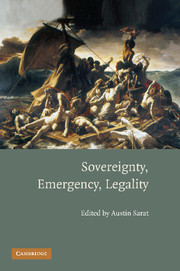Book contents
- Frontmatter
- Contents
- Contributors
- Acknowledgments
- Introduction: Toward New Conceptions of the Relationship of Law and Sovereignty under Conditions of Emergency
- 1 The “Organic Law” of Ex Parte Milligan
- Comment on Chapter 1: David Dyzenhaus, “The ‘Organic Law’ of Ex Parte Milligan”
- 2 Emergency, Legality, Sovereignty: Birmingham, 1963
- Comment on Chapter 2: “Order” in the Court
- 3 The Banality of Emergency: On the Time and Space of “Political Necessity”
- Comment on Chapter 3: Emergencies, Body Parts and Price Gouging
- 4 The Racial Sovereign
- Comment on Chapter 4: Toward a Nonracial Sovereign
- 5 Should Constitutional Democracies Redefine Emergencies and the Legal Regimes Suitable for Them?
- Comment on Chapter 5
- Index
4 - The Racial Sovereign
Published online by Cambridge University Press: 07 May 2010
- Frontmatter
- Contents
- Contributors
- Acknowledgments
- Introduction: Toward New Conceptions of the Relationship of Law and Sovereignty under Conditions of Emergency
- 1 The “Organic Law” of Ex Parte Milligan
- Comment on Chapter 1: David Dyzenhaus, “The ‘Organic Law’ of Ex Parte Milligan”
- 2 Emergency, Legality, Sovereignty: Birmingham, 1963
- Comment on Chapter 2: “Order” in the Court
- 3 The Banality of Emergency: On the Time and Space of “Political Necessity”
- Comment on Chapter 3: Emergencies, Body Parts and Price Gouging
- 4 The Racial Sovereign
- Comment on Chapter 4: Toward a Nonracial Sovereign
- 5 Should Constitutional Democracies Redefine Emergencies and the Legal Regimes Suitable for Them?
- Comment on Chapter 5
- Index
Summary
A dominant theme in post-9/11 scholarship on national security law has been the somber elaboration of necessary and rational trade-offs, or balancings, brought about by the urgently reconstituting relationship between sovereign emergency reality and civil liberty aspiration. This discourse has been critiqued as “Schmittean” for its decisionistic effects, but the core of liberal legal thinking of the period actually remains in tension with “proto-realist” writers like Carl Schmitt, who famously framed sovereignty through the notion of the exception, that is, a politico-legal dynamic that takes hold during times of emergency and calls forth sovereign suspensions of law. Schmitt thought that liberal rule of law could not stand in the way of an effective sovereign and that entertaining such a fantasy could create instability in the underlying political order itself. Paradigmatic Schmittean “decisions on the exception” by sovereign holders of state power were thought to reveal a fundamental myth and potentially fatal fl aw of liberal democratic constitutionalism. This perspective would, in fact, subject many forms of post-9/11 liberal legal balancing discourse to a kind of realist razor that looks to effective power and constraint for its insights. Or, it could push us to look more deeply at the relationship between such liberal rule of law “decisionism” and underlying questions of political economy and social order “stability.”
Schmittean realism describes and endorses the order-seeking world of early twentieth-century inter-imperial rivalry, but its rejection of liberal “ultrapolitics” and faux universalism as well underlines for critical scholars the socially infl ected, identity/ideology-driven basis of the liberal imperialist security state.
- Type
- Chapter
- Information
- Sovereignty, Emergency, Legality , pp. 182 - 227Publisher: Cambridge University PressPrint publication year: 2010
- 1
- Cited by

